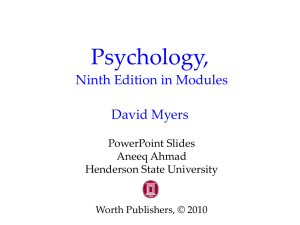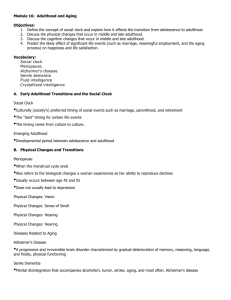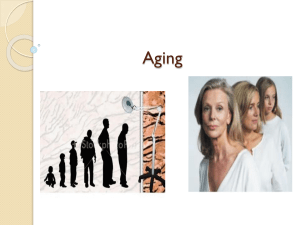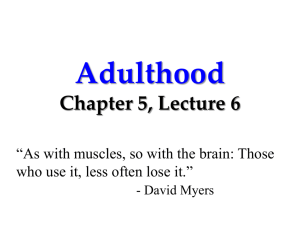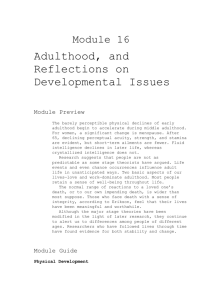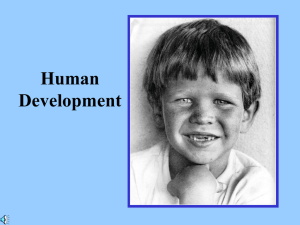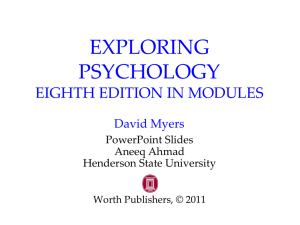File - PSYCHOLOGY
advertisement
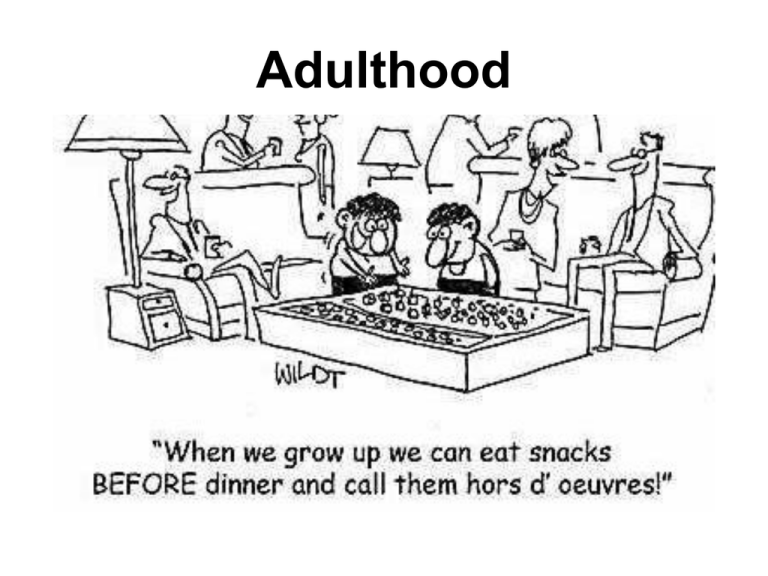
Adulthood Physical Development The peak of physical performance occurs around the mid-twenties, after which it declines imperceptibly for most of us. 2 Middle Adulthood Physical changes of adult life may trigger psychological responses, depending on how varying cultures view aging. In some Eastern cultures, where respect and power come with age, outward signs of advancing years are accepted and even welcomed. In Western cultures, where the perceived ideal is smooth skin and a slim torso, middle-age wrinkles and bulges can threaten self-esteem. Bettman/ Corbis Willie Mays batting performance. 3 Cognitive Development Do cognitive abilities like memory, creativity, and intelligence decline with age the same way physical abilities do? 4 Aging and Memory As we age, we remember some things well. These include recent past events and events that happened a decade or two back. However, recalling names becomes increasingly difficult. 5 Aging and Memory Recognition memory does not decline with age, and material that is meaningful is recalled better than meaningless material. David Myers 6 Aging and Intelligence Cross-sectional studies (where researchers compared people of various ages) suggested that intelligence declines as we age. 7 Aging and Intelligence Longitudinal studies (meaning they retested the same people over a period of years) suggest that intelligence remains relative as we age. 8 9 Aging and Intelligence Longitudinal studies suggest that intelligence remains relative as we age. It is believed today that fluid intelligence (ability to reason speedily) declines with age, but crystalline intelligence (accumulated knowledge and skills) does not. 10 Aging and Other Abilities These cognitive differences help explain why mathematicians and scientists produce much of their most creative work during their late twenties or early thirties, whereas those in literature, history, and philosophy tend to produce their best work in their forties, fifties, and beyond, after accumulating more knowledge. 11 Social Development Many differences between the young and old are not simply based on physical and cognitive abilities, but may instead be based on life events associated with family, relationships, and work. 12 Adulthood’s Ages and Stages Another reason skeptics question age-linked stages, like the midlife crisis, is the social clock—the culturally preferred timing of social events such as marriage, parenthood, and retirement, and it varies from culture to culture and era to era. 13 Adulthood’s Commitments Love and work are defining themes in adult life. Evolutionary psychologists believe that commitment has survival value. Parents that stay together are likely to leave a viable future generation. JLP/ Jose Pelaez/ zefa/ Corbis 14 Marriage • Both Canada and the US now have about one divorce for every two marriages. (So that’s a 50% divorce rate) • Does “test driving” a marriage minimize divorce…meaning living together before you get married? 15 Marriages aren’t without conflict, but after observing the interactions of 2000 couples, John Gottman reported one indicator of marital success: at least a five-to-one ratio of positive to negative interactions. 16 Having Children • Often, love bears children, yet when children begin to absorb time, money, and emotional energy, satisfaction with the marriage itself may decline. • Putting effort into creating an equitable relationship can thus pay double dividends: a more satisfying marriage, which then breeds better parent-child relations. • After children leave home (emptying of the nest), compared to middle-aged women with children at home, those living in an empty nest report greater happiness and greater enjoyment of their marriage. 17 Adulthood’s Commitments Happiness stems from working in a job that fits your interests and provides you with a sense of competence and accomplishment. Charles Harbutt/ Actuality 18 Well-Being Across the Life Span Well-being and people’s feelings of satisfaction are stable across the life span. Fact: When people are asked what they would have done differently if they could relive their lives, their most common answer is “taken my education more seriously and worked harder at it”. 19 Well-Being Across the Life Span From early adulthood to midlife, people typically experience a strengthening sense of identity, confidence, and self-esteem. 20 Well-Being Across the Life Span Teenagers typically come down from elation or up from gloom in less than an hour. Adult moods are less extreme but more enduring. 21 Successful Aging 22 Death and Dying Grief is especially severe when the death of a loved one comes suddenly and before its expected time on the social clock. 23 Death and Dying But contrary to popular misconception… (1) no amount of talking can eliminate the feeling of being alone and separated from the loved one (2) terminally ill and bereaved people do not go through predictable stages, such as denial, anger, and so forth. 24

